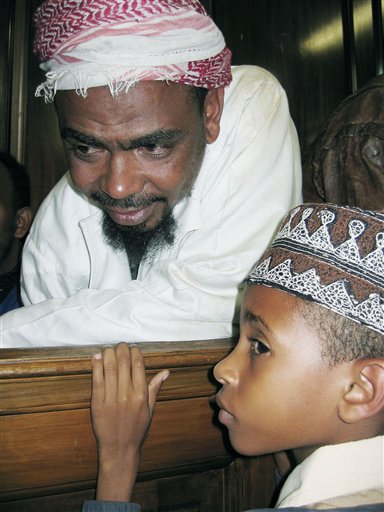FILE- In this file photo of Friday Nov. 21, 2003, Aboud Rogo Mohammed, talks to his 8-year-old son, Khubaid Aboud, in the Nairobi High Court. A Kenyan government task force has failed to establish who killed a Muslim cleric whose assassination one year ago caused days of deadly violence, according to a report released Monday Aug 26, 2013 . Aboud Rogo Mohammed, who had been sanctioned by U.N. and U.S. for supporting the al-Qaida-linked Somali Islamic extremist group al-Shabab, was shot dead last August as he drove his wife to a hospital in the coastal city of Mombasa Aboud Rogo Mohammed, who had been sanctioned by U.N. and U.S. for supporting the al-Qaida-linked Somali Islamic extremist group al-Shabab, was shot dead last August as he drove his wife to a hospital in the coastal city of Mombasa.( AP Photo/Sayyid Azim)
NAIROBI, Kenya (AP) — A Kenyan government task force has failed to establish who killed a Muslim cleric whose assassination one year ago sparked days of deadly violence, according to a report released Monday.
Aboud Rogo Mohammed, who had been sanctioned by the U.N. and U.S. for supporting the al-Qaida-linked Somali Islamic extremist group al-Shabab, was shot dead last August as he drove his wife to a hospital in the coastal city of Mombasa.
Mohammed’s death sparked riots in Mombasa, Kenya’s second city, killing four people, including three security officers.
The government panel recommended in its report that a public inquest be opened and called for further investigation. Mohammed’s wife, Hania Said Saggar, has blamed Kenyan police for her husband’s death. Police deny any involvement but insist Mohammed belonged to a terror cell that planned to bomb Kenyan targets in late 2011.
Kenya has seen a series of extra-judicial killings over the years carried out by security forces, according to the U.N.’s expert on extra-judicial killings. Civil rights activists accuse Kenyan police of routinely killing suspects against whom they cannot build a successful case in court. In 2005 Mohammed had been acquitted of murder charges in the case of the 2002 bombing of a tourist hotel near Mombasa.
The group Muslims for Human Rights says 13 people with suspected links to terror groups have either been killed or have disappeared under unclear circumstances in Kenya so far this year. At least 18 people were killed or disappeared last year, the group said.
Kenya’s director of public prosecutions, Keriako Tobiko, formed a task force to investigate Mohammed’s murder shortly after the cleric was killed. The panel’s report says witnesses describe a gunman who shot Mohammed 600 meters (yards) from a police station by firing an automatic weapon from the passenger seat of a white Subaru without a license plate.
A witness quoted in the report said that after the gunman fired on Mohammed he shouted an expletive at a group of witnesses and used sign language to tell them to keep quiet.
Mohammed — who openly preached jihad against Somalia’s U.N.-backed government — lived in fear before he was killed, according to his lawyer, Mbugua Mureithi. After the sanctions were announced by the U.S. and U.N., Mohammed feared he would be the target of a drone attack, Mureithi said.
Al-Shabab vowed in late 2011 to carry out a large-scale attack in Nairobi in retaliation for Kenya’s sending of troops into Somalia to fight the Islamic insurgents. No such large-scale attack has taken place.
A 2012 U.N. report said that Mohammed tried to steer recruits toward al-Shabab. That report described Mohamed as an extremist who advocated the violent overthrow of Kenya’s government.




